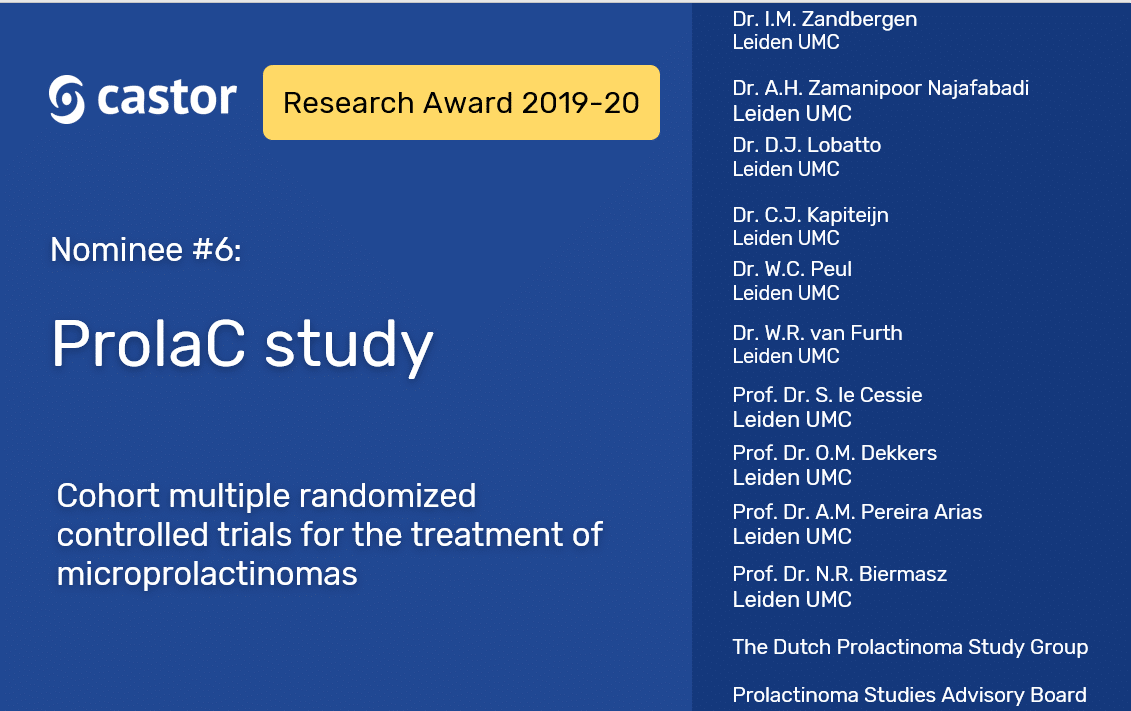When treating microprolactinomas (hormone-secreting tumors on the pituitary gland) is surgical treatment (endoscopic adenoma resection) superior and cost-effective when compared to medical treatment with a dopamine agonist? Our sixth Castor Research Award nominee ProlaC Study set out to study this question.
Research Overview
Almost half of all pituitary adenomas produce the hormone prolactin, and so are considered a prolactinoma. The production of prolactin by the prolactinoma leads to hyperprolactinemia, which brings about the typical symptoms caused by prolactinomas, that is, galactorrhoea, menstrual cycle irregularities, decreased fertility, and decreased libido.
Current guidelines describe dopamine agonists, for example, cabergoline, as first-line treatment for prolactinoma patients and surgical resection as second-line treatment in case of drug intolerance or resistance. Although dopamine agonist treatment is effective in decreasing the prolactin level (and thus the prolactinoma-related symptoms) in most patients, the majority of patients need prolonged treatment (two-year remission rates remain low). Up to 40% of patients experience side-effects.
In contrast, endoscopic trans-sphenoidal prolactinoma resection results in immediate remission in more than 80-90% of patients with a low rate of long-term morbidity from complications (< 3%). We hypothesize that early or upfront endoscopic trans-sphenoidal surgery in patients with a non-invasive prolactinoma of limited size will increase the health-related quality of life and remission rate. To date, no good-quality randomized clinical trials have been performed that compared dopamine agonist treatment to surgery on remission rate or health-related quality of life.
About the team
The study team is from the Leiden University Medical Centre, Departments of Neurosurgery and the Internal Medicine (Division of Endocrinology). Team members include:
- Department of Gynecology : Dr. C.J. Kapiteijn, Reinier de Graaf Gasthuis
- Department of Neurosurgery: Dr. A.H. Zamanipoor Najafabadi BSc, Dr. D.J. Lobatto, Prof. Dr. W.C. Peul, Dr. W.R. van Furth,
- Department of Clinical Epidemiology: Prof. Dr. S. le Cessie
- Department of Internal Medicine (Division of Endocrinology): Prof. Dr. O.M. Dekkers, Prof. Dr. A.M. Pereira Arias, Prof. Dr. N.R. Biermasz,
- The Dutch Prolactinoma Study Group Prolactinoma Studies Advisory Board
Study design and methodology
The study used the multicentre cohort multiple Randomized Clinical Trial design (cmRCT). In January 2018, we started a multicentre observational Cohort Study aimed to longitudinally document current standard care, medical outcomes of treatments (for example, remission rates and the rate of adverse effects), and health-related quality of life for all prolactinoma patients throughout the Netherlands.
The Prolac cohort study went live in April 2019. The multicentre Randomized Clinical Trials (RCT) which begin in June of 2019 consist of three individual but simultaneously running RCTs, all aimed to compare early or upfront endoscopic transsphenoidal surgery to standard care in patients with a non-invasive prolactinoma of limited size. Patients will be divided over the three RCTs based on the treatment they have already received before randomization:
- Newly diagnosed patients who have not yet received prolactinoma treatment
- Patients who have received short (4-6 months) pre-treatment with a dopamine agonist
- Patients who have a persisting prolactinoma after long (> 2 years) pre-treatment with a dopamine agonist.
Research outcome
The main outcomes for the RCT are health-related quality of life after 12 months and remission rate after 36 months. Health-related quality of life is defined with the score on the Mental Health Scale of the MOS SF-36 12 months after randomization. Disease remission is defined as a normal prolactin level (according to the normal values of the laboratory where it is measured) in the absence of dopamine agonist treatment, 36 months after randomization.
Secondary outcomes of the RCT include cost-effectiveness, clinical and biochemical disease control, adverse effects of treatment, and disease bother measured with the Leiden Bother and Needs Questionnaire. The observational Cohort Study also assesses these outcomes of current standard care for all prolactinoma patients.
How Leiden University Medical Centre uses Castor
The team uses Castor EDC as an electronic Case Record Form and Data Management System, which is accessible from all study sites, for both the observational Cohort Study and the RCT. The team will randomize participants in the RCT using the Castor randomization tool. For both the Cohort Study and the RCT, the team uses Castor functionality to send and collect questionnaires electronically.
“In general, what I value about Castor, is the company mentality it breathes,” said Ingrid Zandbergeg.
“As a more experienced user, I feel my database and eCRF have benefitted and will continue to benefit from the expertise, enthusiasm, and availability of the Castor team. More importantly, the form exchange, webinars, and the user manual have helped me build my database and have inspired me to share my experiences with my colleagues and to share with the hospital data management department to create a forum for improving data management awareness and sharing experience between departments.”
“One of the most important features of Castor for our multicentre studies is its accessibility from the numerous different study sites with which we collaborate, which ultimately enforces the protection of participant privacy. It is valuable to us that by using Castor, we can control and monitor access to CRFs of a particular study site for each individual investigator. We especially value the shielded part of the CRF to store a participant’s email address for distributing questionnaires.”
Stay tuned on the Castor EDC blog for more 2019-2020 Castor Research Awards nominations. We wish the nominees good luck and smart science—and encourage all researchers to share their projects for the chance to win €3000!

